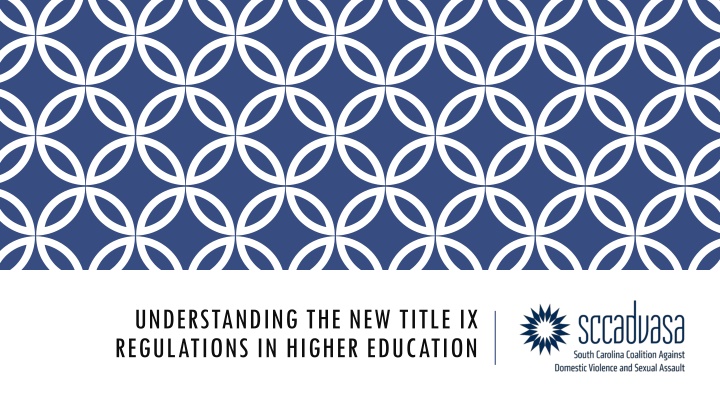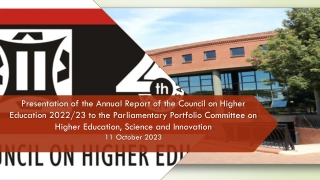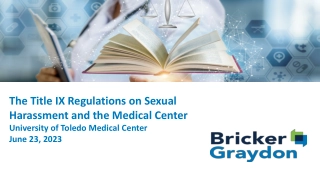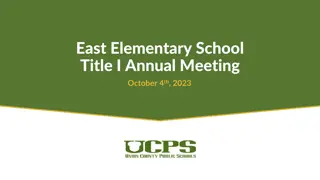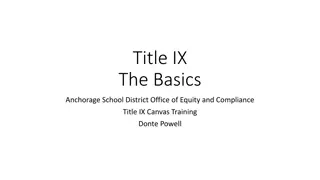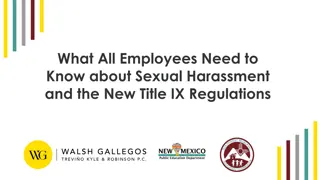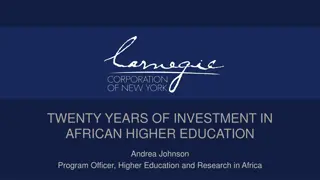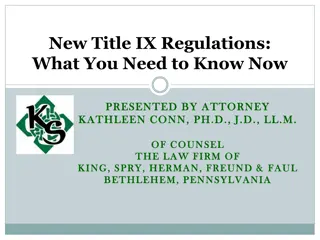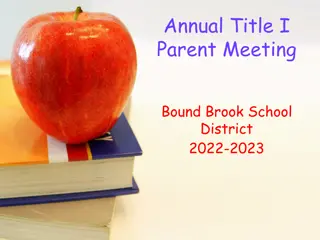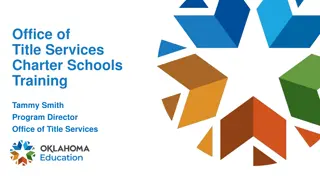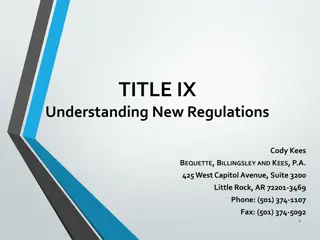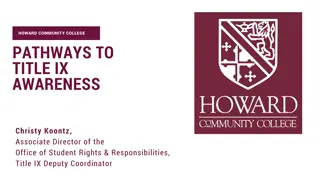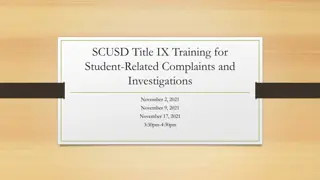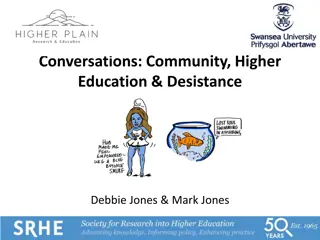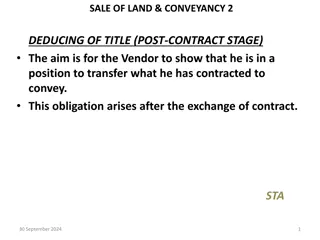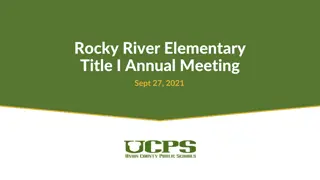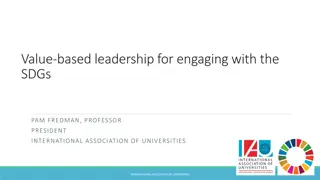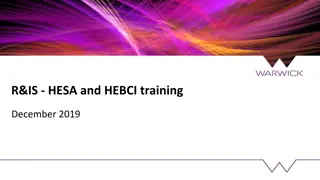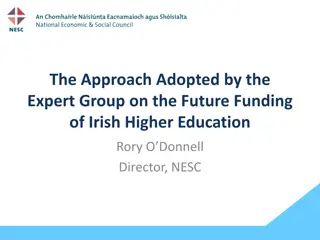Title IX Regulations in Higher Education
Title IX of the Education Amendments of 1972 prohibits discrimination based on sex in educational programs receiving federal financial assistance. The history and status of Title IX regulations, along with the Department of Education's guidance, have evolved over the years to address sexual harassment and ensure equal opportunities in education.
Download Presentation

Please find below an Image/Link to download the presentation.
The content on the website is provided AS IS for your information and personal use only. It may not be sold, licensed, or shared on other websites without obtaining consent from the author.If you encounter any issues during the download, it is possible that the publisher has removed the file from their server.
You are allowed to download the files provided on this website for personal or commercial use, subject to the condition that they are used lawfully. All files are the property of their respective owners.
The content on the website is provided AS IS for your information and personal use only. It may not be sold, licensed, or shared on other websites without obtaining consent from the author.
E N D
Presentation Transcript
UNDERSTANDING THE NEW TITLE IX REGULATIONS IN HIGHER EDUCATION
SCCADVASA TITLE IX PROJECT TEAM Hannah Stewart Coordinator of Prevention & Specialized Advocacy Amra Marshall Systems Advocacy Coordinator Kharimah Dessow Tricia Ravenhorst Attorney General Counsel Legal Assistance to Victims Program Katie Reid Director of Systems Advocacy, Prevention & Training
SCCADVASA TITLE IX SERVICES Legal information & technical assistance to attorneys & advocates Network of contract attorneys to represent victims &/or serve as advisors in Title IX proceedings & concurrent legal matters Legal Services Prevention & Outreach College Consortium Community Educators Roundtable Training Systems Change Technical assistance to Member Organizations & partners seeking to improve policies and direct services Supporting Sexual Assault Response Team (SART) efforts to improve the community response to student victims on & off campus
HISTORY & STATUS OF TITLE IX REGULATIONS
WHAT IS TITLE IX? Title IX of the Education Amendments of 1972 sexual harassment Enforced By: Prohibits discrimination on the basis of sex in education programs and activities that receive federal financial assistance. discrimination in employment Lack of equal opportunity in athletics US Dept of Educ., Office of Civil Rights US EEOC Private litigation discrimination in STEM courses & programs discrimination based on pregnancy
HISTORY OF DEPARTMENT OF EDUCATION GUIDANCE ON TITLE IX DOE Office for Civil Rights (OCR) issues 1st Sexual Harassment Guidance document 1997 US Supreme Court determines schools can be liable if the school is deliberately indifferent after receiving actual notice of harassment; this is a higher standard for private litigation seeking money 1998 & 1999 Revised Sexual Harassment Guidance issued retains administrative standard requiring schools to address harassment if an responsible employee knew or should have known 2001 Dear Colleague Letters issued requires preponderance of the evidence standard & interim measures to ensure access to educational programs 2011, 2014 & 2015 Withdrawal of the 2011 & 2014 Dear Colleague Letters & issued new Q&As; increased emphasis on protections for respondents Sept 2017
HISTORY & STATUS OF NEW TITLE IX REGULATIONS Nov 2018 Proposed regulations published Notice & Comment period closes 124,196 comments received Feb 2019 Final regulations released 2,033 pages May 6, 2020 4 major lawsuits filed opposing the regulations May June 2020 Effective date of new regulations Aug 14, 2020
PENDING LITIGATION AGAINST THE REGULATIONS Know Your IX, et al v. Devos May 14 - Maryland New York v. DOE June 4 - S. District of NY Pennsylvania, et al v. Devos June 4 D.C. Victims Rights Law Center, et al v. Devos June 10 - Mass.
https://system.suny.edu/sci/tix2020/ NARROWING THE SCOPE OF TITLE IX
ADOPTS THE MORE RESTRICTIVE LIABILITY STANDARD REQUIRED FOR PRIVATE LAWSUITS Previous New Title IX violation if school does not institute a reasonable response Must take prompt & reasonable corrective action Title IX violation only if school is deliberately indifferent response is clearly unreasonable in light of the known circumstances
WHEN IS SEXUAL HARASSMENT COVERED BY TITLE IX?
NEW DEFINITION OF SEXUAL HARASSMENT Previous standard unwelcome conduct of a sexual nature New Standard 1. Quid pro quo harassment 2. Unwelcome conduct determined by a reasonable person to be so severe, pervasive, AND objectively offensive that it effectively denies a person equal access to the recipient s education program or activity; OR 3. Sexual assault, dating violence, domestic violence or stalking
OFFENSES DEFINED BY THE CLERY ACT If there is a single incident of one of the following crimes, the incident is considered sexual harassment under Title IX. Sexual Assault: an offense classified as a forcible or nonforcible sex offense under the uniform crime reporting system of the Federal Bureau of Investigation (As defined by The Clery Act, 20 U.S.C. 1092(f)(6)(A)(v)) An offense that meets the definition of rape, fondling, incest, or statutory rape as used in the FBI's UCR program and included in Appendix A of this subpart. (34 CFR 668.46(a)) Rape: The penetration, no matter how slight, of the vagina or anus with any body part or object, or oral penetration by a sex organ of another person, without the consent of the victim. Sex Offenses: Any sexual act directed against another person, without the consent of the victim, including instances where the victim is incapable of giving consent. A. Fondling The touching of the private body parts of another person for the purpose of sexual gratification, without the consent of the victim, including instances where the victim is incapable of giving consent because of his/her age or because of his/her temporary or permanent mental incapacity. B. Incest Sexual intercourse between persons who are related to each other within the degrees wherein marriage is prohibited by law. C. Statutory Rape Sexual intercourse with a person who is under the statutory age of consent. (34 CFR 668.46, Appendix A)
OFFENSES DEFINED BY VAWA If there is a single incident of one of the following crimes, the incident is considered sexual harassment under Title IX. Dating violence: means violence committed by a person (A) who is or has been in a social relationship of a romantic or intimate nature with the victim; and (B) where the existence of such a relationship shall be determined based on a consideration of the following factors: (i)The length of the relationship, (ii)The type of relationship, (iii)The frequency of interaction between the persons involved in the relationship. (As defined by VAWA, 34 U.S.C. 12291(a)(10)) Domestic violence: includes felony or misdemeanor crimes of violence committed by a current or former spouse or intimate partner of the victim, by a person with whom the victim shares a child in common, by a person who is cohabitating with or has cohabitated with the victim as a spouse or intimate partner, by a person similarly situated to a spouse of the victim under the domestic or family violence laws of the jurisdiction receiving grant monies, or by any other person against an adult or youth victim who is protected from that person s acts under the domestic or family violence laws of the jurisdiction. (As defined VAWA in 34 U.S.C. 12291(a)(8)) Stalking: means engaging in a course of conduct directed at a specific person that would cause a reasonable person to (A) fear for his or her safety or the safety of others; or (B) suffer substantial emotional distress. (As defined by VAWA in 34 U.S.C. 12291(a)(30))
HEIGHTENED NOTICE REQUIREMENT TO TRIGGER TITLE IX OBLIGATIONS Previous New Knew or should have reasonably known Actual knowledge required No notice required if a employee- student incident within em/ee s duties By Title IX coordinator or official w/ authority to institute corrective measures in higher ed. By responsible employee authority to act, duty to report or student reasonably believes has authority By any employee in lower ed.
EXCLUDED INCIDENT LOCATIONS, EVEN IF RESULTS IN HOSTILE EDUC. ENVIRONMENT Previous New Location of harassment not relevant Focus is on whether harassment results in denied or limited access to educ. program or activity Despite impact of harassment, not covered by Title IX if it occurs: outside the education program or activity ; i.e. off-campus or online outside the US
VICTIM WHO LEAVES SCHOOL NOT PERMITTED TO FILE COMPLAINT Previous New No restriction Victim must be participating or attempting to participate No exception, even if decision not to participate is because of harassment No exception, even if alleged harasser remains at school 3rdparty can t file complaints even if witness to harassment
SCHOOL MAY DISMISS COMPLAINT IF RESPONDENT LEAVES New Schools permitted to dismiss complaint if respondent is no longer enrolled or employed or school is unable to collect sufficient evidence
RELIGIOUS EXEMPTION REMAINS AVAILABLE Exemption is not available to all faith-based institutions. Exemption is available to schools controlled by religious institutions Eligible schools may request an exemption if they believe compliance with Title IX would be incompatible with any specific tenets of the school s faith Final Regulations do not seem to conflict with how a faith-based institution may choose to sanction a responsible person
DISCUSSION: What happens if the school determines that the incident is not covered by Title IX?
SUPPORTIVE MEASURES & EMERGENCY REMOVAL Previous New Required to implement interim measures - services, accommodations & other options offered to victims prior to final outcome Some schools also offered supportive services to reporting & non-reporting victims Required to direct harasser to have no contact Required to provide supportive measures to both parties to ensure equal access to programs Prohibits supportive measures that are punitive, disciplinary or unreasonably burdensome to other party Includes mutual restrictions on contact Permits emergency removal if immediate threat to physical health & safety of student or others arising from allegations of sex. harassment.
VICTIM CONFIDENTIALITY & AUTONOMY Previous New responsible employee mandated to report harassment to officials Undesignated employees not required to report to officials Title IX coordinator can override student s request not to initiate an investigation; respondent to be notified School designates certain confidential employees School not to initiate investigation without victim consent
INFORMAL RESOLUTION PROCESS Schools may offer an informal resolution process AFTER a formal complaint has been filed Both parties must provide voluntarily written consent Prohibited in cases where an employee is accused of sexually harassing a student Either party can withdraw at any time & resume the formal complaint process The informal resolution process i.e. mediation or restorative justice process is conducted by a trained facilitator The resolution can include discipline against the respondent
DISCUSSION What are your concerns regarding victim safety, access to educational programs & autonomy to request an investigation?
https://atixa.org/r3/ NEW INVESTIGATIVE & HEARING PROCEDURES
TRAINING OF OFFICIALS REQUIRED Mandates training for the following officials: Title IX Coordinators Investigators Decision-makers Facilitators of informal resolution process Mandatory Training Topics Scope of institution s education program or activity Issues of relevance, including application of rape shield provision How to conduct grievance process **Prohibited from receiving training that relies on sex stereotypes.
TIMEFRAME OF INVESTIGATION Previous New Recommended completion within 60 days reasonably prompt timeframe At least 20 days (two 10 day timelines) Temporary delay or limited extension for good cause , i.e. concurrent law enforcement activity Prohibited from delaying investigation merely because of concurrent law enforcement investigation
PRESUMPTION OF NON-RESPONSIBILITY OF RESPONDENT Previous New No presumption required Requires equitable resolution of complaint Required to presume that respondent is not responsible; presumes incident did not occur Credibility cannot be based on status as complainant, respondent or witness
HIGHER STANDARD OF PROOF PERMITTED Previous New Preponderance of the Evidence Standard May choose clear & convincing or preponderance of the evidence Must use same standard for complaint against students & employees
INVESTIGATION PROCEDURES & EVIDENCE REVIEW New School can t restrict party s ability to discuss allegations Exercise of 1stAmend. Rights is not considered retaliation Schools can discipline victims for making materially false statements in bad faith ANY relevant evidence collected by investigators must be given to both parties for at least 10 days for inspection & comment prior to the completion of the final Investigation Report Investigation Report required available for review & comment
LIVE HEARINGS, CROSS-EXAMINATION & ADVISORS OF CHOICE REQUIRED New Live hearings required in higher ed. Live hearing permitted in lower ed. Cross-examination by party s advisor of choice must be allowed School to provide advisor if party does not have one Limited accommodations to parties permitted; i.e. separate rooms
EVIDENCE OF PRIOR SEXUAL HISTORY Evidence of prior sexual history with other persons is not permitted. HOWEVER it is permitted to ask questions re: complainants dating or romantic history with other people - complainant s prior sexual history with respondent in order to prove consent
EXCLUSIONS OF EVIDENCE New Exclusion of oral & written statements of any party or witness who declines to testify or answer every question Evidence protected by attorney-client privilege Prohibits inclusion of a party s medical, psych or similar records with written consent
DISCUSSION What can we do to prepare & support victims in formal complaint process or informal resolution process?
RESOURCES TO FOLLOW SUNY Student Conduct Institute Joint Guidance on Federal Title IX Regulations https://system.suny.edu/sci/tix2020/ ATIXA - 2020 Regs Rapid Response Resource Center https://atixa.org/r3/
Web: Office: For members contact info: www.sccadvasa.org/Get-Help/ 24-hour crisis: National Sexual Assault Hotline 800-656-4673 National Domestic Violence Hotline 800-799-7233 www.sccadvasa.org 803-256-2900
